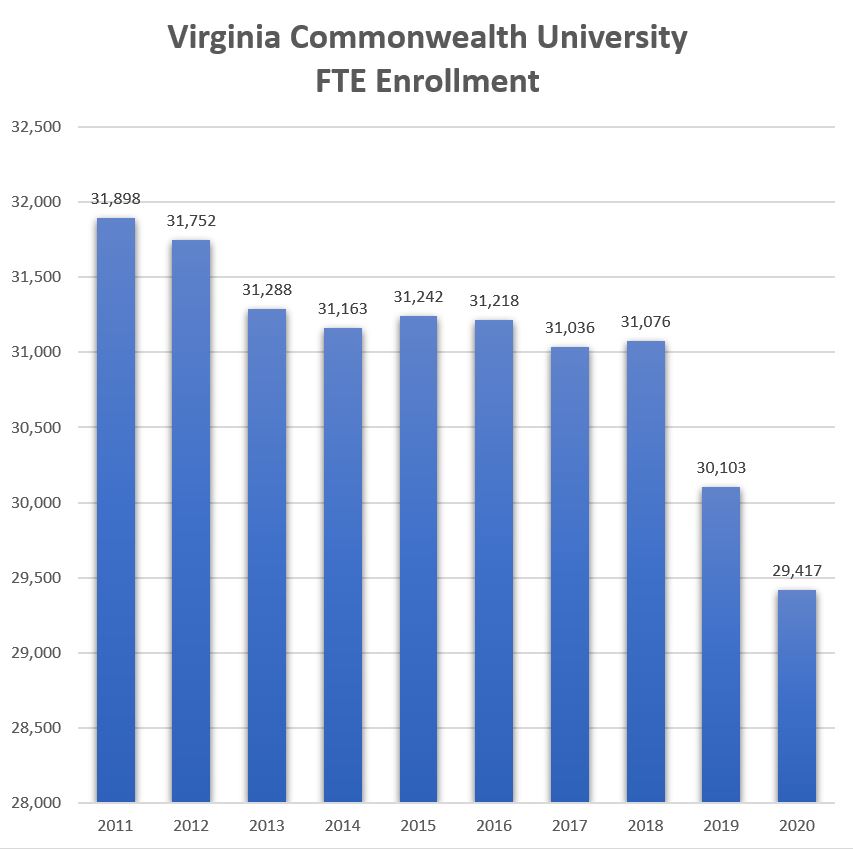by James A. Bacon
Miracle of miracles! Virginia Commonwealth University President Michael Rao is proposing to keep tuition flat in the next academic year. Assuming the Board of Visitors concurs, the university will have declined to increase the cost of tuition for three years running.
VCU students have among the greatest needs in the state, said Rao, according to the Richmond Times-Dispatch, and the university is committed to remaining accessible to them.
It’s refreshing to hear such concern for the well being of VCU’s students, 58% of whom are “people of color” and many of whom are first-generation college attendees. The sentiment is a welcome change from previous years in which VCU increased tuition and fees more aggressively than most other public Virginia four-year institutions, leaving it with the fifth highest tuition and fees in the state.
VCU’s new solicitude for the financial hardships of its students also may have something to do with the fact that its enrollment has eroded over the past decade, as seen in the graph above.
Although tuition will remain flat, the VCU administration proposes hiking student fees by $153 and raising the cost of room and board by $318 — an increase, all told, of $471 in the total cost of attendance. That will bring the one-year cost for in-state undergraduate students to $26,643, an increase of about 1.8%.
According to the RTD, Rao expects enrollment next fall to return to near normal. Students will resume in-person education, although they might be asked to continue wearing masks. But there’s a hitch: VCU will offer more online classes than before the pandemic — as much as 25% of the curriculum. Before the pandemic, about 12% of courses were remote.
VCU has been testing the limits for how much tuition the market will bear. Between 2015-16 and 2018-19, applications to VCU have increased, as they have to nearly all four-year colleges and universities. But two key metrics indicate increasing resistance to VCU’s value proposition.
To prop up enrollment, VCU accepted a higher percentage of students. The acceptance rate increased from 78.8% of applicants in 2015-16 to 85.4% in 2018-19, according to State Council of Higher Education for Virginia (SCHEV) data. (SCHEV does not publish data for more recent years.)
Likewise, the enrollment “yield” (the percentage of students enrolling after being accepted) declined from 35.3% to 32.4% over the same period, The decline in yield for out-of-state students, whose tuition runs more than $20,000 higher than for in-state students, was even more precipitous — tumbling from 20.0% to 13.3%. The loss of out-of-state students is especially painful for VCU finances.
The median SAT score (verbal plus math) declined from 1090 in the 2015-16 academic year to 1060 in the current year.
Bacon’s bottom line: VCU’s move to hold tuition flat contrasts to Virginia Tech, whose board approved a 2.9% hike. The College of William & Mary has proposed a 2% raise, while the University of Virginia is pondering a 3.1% increase. Virginia State University will not raise tuition, according to the RTD.
Holding the line on tuition should marginally improve VCU’s value proposition compared to other Virginia institutions that are boosting tuition and fees. It will be interesting to see, however, how students and their families respond to paying the full freight while taking 25% of classes online.



